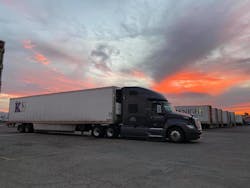Knight-Swift, Cummins testing hydrogen fuel cells on long hauls
Knight-Swift Transportation, operator of more than 19,000 trucks across America, has set an ambitious goal for its fleet: a 50% reduction in carbon emissions by 2035.
For a fleet currently mostly running on diesel, a mission like this calls for groundbreaking innovation.
As the transportation sector continues to develop zero-emission vehicles, battery electric trucks are in the spotlight. Fully electric powertrains are a fairly new, zero-emission solution well-suited for short-range hauls. Electric trucks will certainly play a role in the innovation of sustainable power, but they don’t always address every need in the industry. When it comes to longer treks over 400 miles, hydrogen fuel cells are ready to pick up where electric batteries leave off.
“We view hydrogen as having potential to open up new horizons for us in longer-length hauls,” said Dave Williams, vice president of equipment and government affairs at Knight-Swift Transportation. “Knight-Swift looks forward to hydrogen developing as a zero-emission solution for our long-haul needs.”
Cummins and Knight-Swift have a partnership intended to fuel progress for the future. The drivers of Knight-Swift have been given an opportunity to test hydrogen fuel cell vehicles in the real world. This testing gives both companies valuable information on the technology’s benefits, limitations and costs, along with how drivers feel about the technology and react to it. After all, they’re the professionals on the front lines who are set to use this new technology every day in the not-so-distant future.
Of course, infrastructure will need innovation in order to facilitate the adoption of hydrogen fuel cells. In testing the vehicles on real routes currently in operation, Knight-Swift and Cummins say they’re beginning to understand what infrastructure improvements are needed. With new powertrain technology and plans for improved infrastructure underway, hydrogen fuel cells are well-positioned to lead transportation into a greener future.
“We’re grateful for our working relationship with Cummins on something where we don’t quite know all the answers,” Williams said. “It’s exciting to develop a technology with so many things still unknown. We will learn through this process to develop and refine the technology as we go.”

